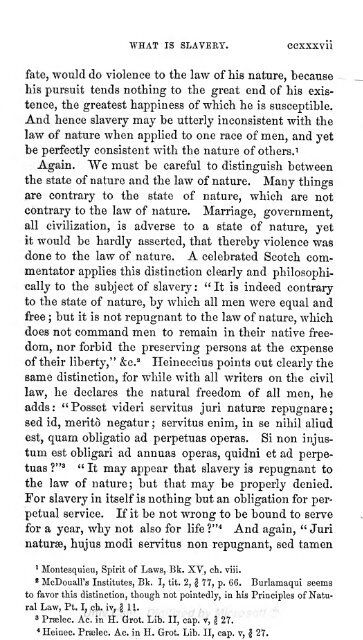Untitled - African American History
Untitled - African American History
Untitled - African American History
You also want an ePaper? Increase the reach of your titles
YUMPU automatically turns print PDFs into web optimized ePapers that Google loves.
WHAT IS SLAVERY. CCXXXVli<br />
fate, would do violence to the law of his nature, because<br />
his pursuit tends nothing to the great end of his exis-<br />
tence, the greatest happiness of which he is susceptible.<br />
And hence slavery may be utterly inconsistent with the<br />
law of nature when applied to one race of men, and yet<br />
be perfectly consistent with the nature of others. 1<br />
Again. We must be careful to distinguish between<br />
the state of nature and the law of nature. Many things<br />
are contrary to the state of nature, which are not<br />
contrary to the law of nature. Marriage, government,<br />
all civilization, is adverse to a state of nature, yet<br />
it would be hardly asserted, that thereby violence was<br />
done to the law of nature. A celebrated Scotch commentator<br />
applies this distinction clearly and philosophi-<br />
cally to the subject of slavery: "It is indeed contrary<br />
to the state of nature, by which all men were equal and<br />
free ; but it is not repugnant to the law of nature, which<br />
does not command men to remain in their native free-<br />
dom, nor forbid the preserving persons at the expense<br />
of their liberty," &c. 3<br />
Heineccius points out clearly the<br />
same distinction, for while with all writers on the civil<br />
law, he declares the natural freedom of all men, he<br />
adds: "Posset videri servitus juri nature repugnare;<br />
sed id, meritd negatur ; servitus enim, in se nihil aliud<br />
est, quam obligatio ad perpetuas operas. Si non injustum<br />
est obligari ad annuas operas, quidni et ad perpetuas<br />
?" 3<br />
"It may appear that slavery is repugnant to<br />
the law of nature; but that may be properly denied.<br />
For slavery in itself is nothing but an obligation for per-<br />
to be bound to serve<br />
petual service. If it be not wrong<br />
for a year, why not also for life ?" 4 And "<br />
again, Juri<br />
naturae, hujus modi servitus non repugnant, sed tarnen<br />
1<br />
Montesquieu, Spirit of Laws, Bk. XV, ch. viii.<br />
8 McDouall's Institutes, Bk. I,<br />
tit.<br />
2, $ 77, p. 66. Burlamaqui seems<br />
to favor this distinction, though not pointedly, in his Principles of Natu-<br />
ral Law, Pt. I, ch. iv, 11.<br />
8 Pralec. Ac. in H. Grot. Lib. II, cap. v, g 27.<br />
4 Heinec. Praelec. Ac. in H. Grot. Lib. II, cap. v, \ 27.


